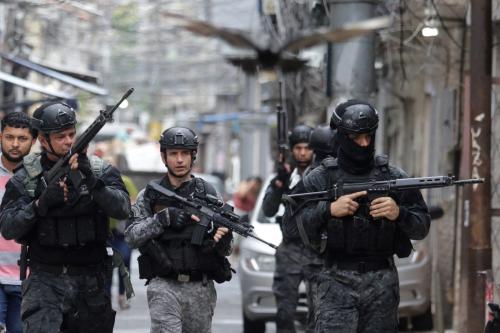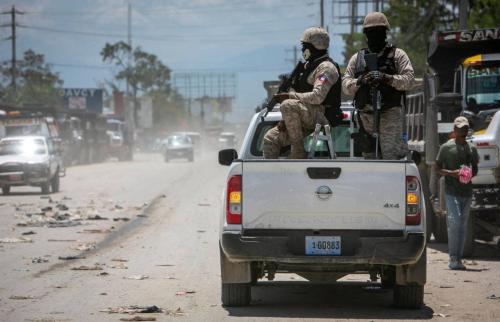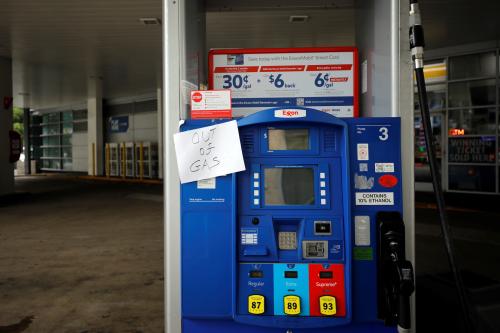This piece is part of a series titled “Nonstate armed actors and illicit economies in 2024” from Brookings’s Initiative on Nonstate Armed Actors.
The global footprint of criminal groups from China1 has expanded along with China’s economic and geopolitical presence around the world. North America’s fentanyl crisis thrust China-linked criminal networks and their expanding international connections, such as with the Sinaloa Cartel, to U.S. policy forefront.
However, the scope of organized crime from China extends far beyond global drug trafficking and money laundering. Internationally, Chinese criminal groups engage in poaching and wildlife trafficking, cybercrime, and elaborate fraud and scams, also featuring people trafficking and enslavement. Long experienced in illegally bringing people to the United States and Canada, criminal networks from China have intensified activities at the U.S.-Mexico border.
Chinese fishing vessels, often illegally devastating protected marine areas and other countries’ exclusive economic zones, can facilitate drug trafficking and serve as the Chinese government’s maritime militia proxies in extraterritorial claims and military confrontations. They can also augment Chinese espionage around the world.
Indeed, these criminal networks provide a variety of services to the Chinese government, the Chinese Communist Party (CCP), and Chinese legal enterprises. They help build networks of corruption and influence among foreign politicians and businesses. In interviews with Vanda Felbab-Brown, current and former law enforcement officials from the United States, Asia, Australia, and Africa stated that China-linked criminal groups monitor the Chinese diaspora and act as extralegal enforcers on behalf of Chinese authorities against those who speak and act against the Chinese government and CCP. Thus, Chinese government officials often unofficially extend the umbrella of party protection and government authority to these actors.
Because of these linkages to the Chinese government and their own entrepreneurial skills, China-linked criminal networks in 2024 are likely to expand their geographic reach and deep role in various illegal economies.
Chinese cybercrime networks’ high skillsets and linkages to the Chinese government also position Chinese criminal networks as early adopters of artificial intelligence.
Key issues for 2024
In 2024, the key issues pertaining to Chinese organized crime include:
- the extent to which China’s facilitation of Russia’s invasion of Ukraine will entrench and expand the presence of Chinese criminal groups in Russia and Russian criminal groups in China. China’s efforts to help Russia evade Western sanctions by providing equipment and goods are of particular concern.
- whether Mexican cartels’ expansion into methamphetamine smuggling in Australia, New Zealand, and perhaps elsewhere in East Asia results in violent clashes with Chinese criminal groups.
- whether Chinese criminal groups intensify synthetic drug trafficking into Europe or yield that market to the Mexican cartels.
A wide panoply of Chinese criminal networks
Our research has identified over 100 China-linked criminal networks of diverse structures involved in various illegal economies. The groups showcased below exemplify the scope of their operations.
Perhaps the most notorious and long-lasting among Chinese criminal groups, the triads, such as Sun Yee On, Wo Shing Wo, and 14K, have a diversified economic portfolio featuring drug trafficking, illegal gambling, racketeering, human trafficking, bribery, and corruption, as well as legal economic enterprises. Led by Wan Kuok Koi, aka “Broken Tooth,” the 14K Triad is one of the most successful criminal groups. Beyond dominating methamphetamine trafficking in the Asia-Pacific region, the 14K Triad is also a prime example of a criminal group providing a variety of services to the Chinese government.
The emergence of synthetic opioids has diversified the type of Chinese criminal actors involved in drug trafficking. With fentanyl precursor smuggling generating far smaller profits than methamphetamine trafficking, many Chinese criminal actors involved in synthetic opioids are essentially small family-based groups, such as the Zhang Drug Trafficking Organization.
Other actors are larger than family networks but likely less centralized and expansive than the triads. These include the Fujian Gang or Fujian Mafia and the Cantonese Mafia, crime syndicates originating or having some connections in particular locations in China. Such terms are frequently applied to various criminal networks linked to China, without necessarily any clear direction from headquarters in China or even the existence of such headquarters there.
In Bolivia, the Putian Gang, involved in trafficking jaguar parts, for example, gets labeled a South American branch of the “Fujian Mafia.” Illegal casinos operated by criminal networks closely linked to the Fujian Mafia in Bolivia and Argentina, admitting only Chinese customers, serve as fronts for money laundering. In Chile and Spain, the Bang of Fujian group operates extensive illegal marijuana plantations that exploit and coerce smuggled Chinese migrants. The illegal cannabis is then sold to local and regional vendors. Chinese crime groups are also building up their nexus of cannabis and forced migrant labor operations in the United States, even in states that legalized marijuana. In Chile, the Fujian Gang is also alleged to traffic ketamine and ecstasy in its karaoke establishments.
Prior to moving into Latin and North America, wildlife trafficking networks from China have for years been decimating vast genera of animal and plant species across Africa and Asia. During the pre-2018 peak of elephant poaching in Africa, the Yang Fenglan network was a large operator in ivory trafficking from Africa to China. Despite China’s 2018 ban on ivory sales, ivory trafficking to China from Africa again intensified in 2023 as China lifted its COVID-19 travel restrictions. The poaching of other species, such as rhinos, for Chinese and Asian markets also increased over the past year, a dangerous trend likely to persist in 2024.
Around the world, Chinese criminal groups have greatly expanded their money laundering presence, so much so that they are even displacing large established Latin players in the Black Peso Market and becoming the go-to actors for Mexican cartels. Despite intense Australian law enforcement efforts, Australia has long been a major destination for Chinese illegal money. An Australian-based Chinese syndicate, the Chen Organization, is believed to be a major money laundering actor there, processing hundreds of millions of illicit dollars, for high-profile clients, including the 14K Triad. The Chen Organization, like other major Chinese laundering networks such as the Sydney-based and now-dismantled Xin Money Laundering Organization, utilizes shadow banks, casinos, cryptocurrency, and premium property portfolios.
Casinos, gambling, and speculation have not only served as money laundering tools for criminal groups but also as criminal rackets in and of themselves. For centuries, speculation and gambling, despite the latter being illegal in China, have been widely popular in China, and Chinese criminal groups have been deeply involved in both, often running extensive illegal gambling operations. KK Park, another example of a Chinese illicit gambling empire spanning the Philippines, Cambodia, and Myanmar, is also associated with human trafficking. Its single lines of operations, such as a casino in Myanmar, generated at least $15 billion of illicit revenue.
Like many other special economic zones in Asia, The Golden Triangle Special Economic Zone (GTSEZ) on the border intersection of Laos, Thailand, and Myanmar is a gambling haven riddled with crime, fraud, forced labor, sexual exploitation, cybercrime, corruption, and the trafficking of various contraband, such as drugs and wildlife primarily catering to Chinese tourists. The GTSEZ crime epicenter is the Kings Roman Casino overseen by the Chinese businessman and crime boss Zhao Wei. The Zhao Wei Transnational Criminal Organization has been intensely implicated in methamphetamine trafficking in cooperation with Myanmar’s United Wa State Army.
Policy implications
Even as China prides itself on its tough anti-crime policies and annually highlights its large numbers of arrested criminals for a wide variety of offenses, Beijing rarely acts against the top echelons of Chinese criminal syndicates. This is especially true for those who also service Chinese authorities’ objectives, unless they specifically contradict a narrow set of Chinese government interests. Behavior and actions that do trigger robust law enforcement actions center on threats to the Chinese government and the CCP’s hold on power, their ability to suppress political dissent, and the expatriation of money from China.
The Chinese government also acts against criminal groups that engage in violence (a rare occurrence) or whose activities become visible in China and generate negative publicity there, such as the entrapment and enslavement of Chinese citizens in Chinese scam operations. Finally, when faced with intense international pressure, such as over the role of Chinese criminal groups in fentanyl and precursor trafficking, China may also take law enforcement action, though its robustness is a function of its geopolitical orientation and bilateral relations.
Since China’s cooperation with U.S. law enforcement interests will remain limited due to geopolitical competition, the United States should expand and smarten its own measures against Chinese criminal actors. Focused intelligence collection, analysis, and reporting by a variety of U.S. government actors against Chinese criminal groups, including their wildlife trafficking, illegal fishing, and illegal mining activities, beget new opportunities to understand not just their operations and vulnerabilities but also their linkages to Chinese government actors and espionage activities.
To achieve such objectives, intelligence collection on the entire spectrum of Chinese criminal groups and all of the economies in which they are involved should be elevated within the U.S. National Intelligence Priorities Framework and by the U.S. intelligence community to a collection and reporting priority.
A wide range of U.S. government agencies, including the U.S. intelligence agencies, the Department of State, the Department of Defense, and the U.S. Fish and Wildlife Service, should be authorized to support U.S. law enforcement against Chinese criminal actors through intelligence collection, analysis, and criminal investigations, and when appropriate, arrest and seizure. China-linked criminal groups should also be prioritized in interagency Organized Crime Drug Enforcement Task Forces investigations.
-
Footnotes
- A note on terminology: When possible and unless we are clearly talking about criminal groups that operate in China, we try to avoid the term “Chinese criminal groups” to avoid racial connotations the term can carry for some. To the extent that we used the term, we use it in the same way that the terms Albanian, Russian, or Mexican criminal groups are used in organized crime analysis. Often, we instead use the terms “criminal groups linked to” or “from China.” Those latter terms, however, are not problem-free. “Linked to China” may imply an exaggerated sense of direction from Chinese government authorities. While such management exists, it varies across group, location, and time. “Groups from China” can also be misleading since criminal networks operate among Chinese diaspora communities that left decades ago and have minimal connections to the country of China.
The Brookings Institution is committed to quality, independence, and impact.
We are supported by a diverse array of funders. In line with our values and policies, each Brookings publication represents the sole views of its author(s).










Commentary
Chinese crime and geopolitics in 2024
January 29, 2024